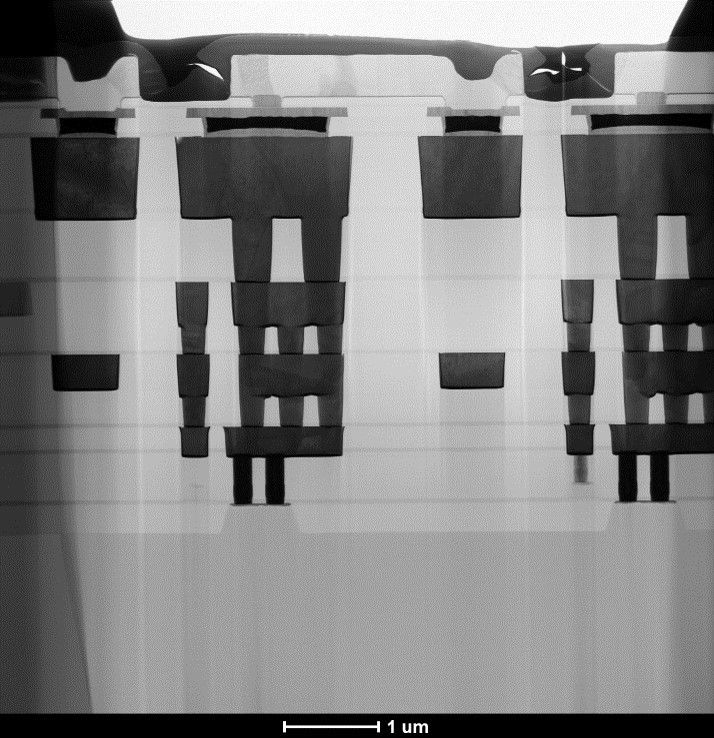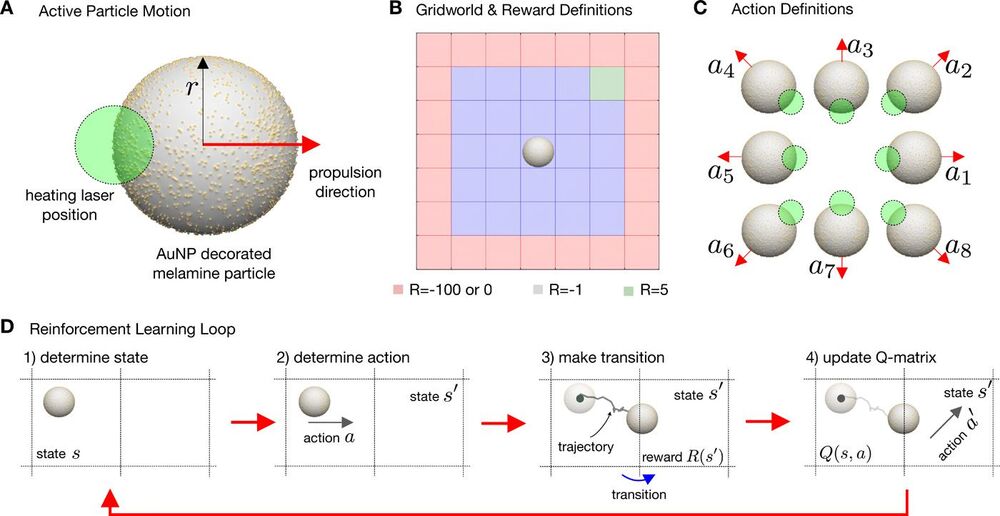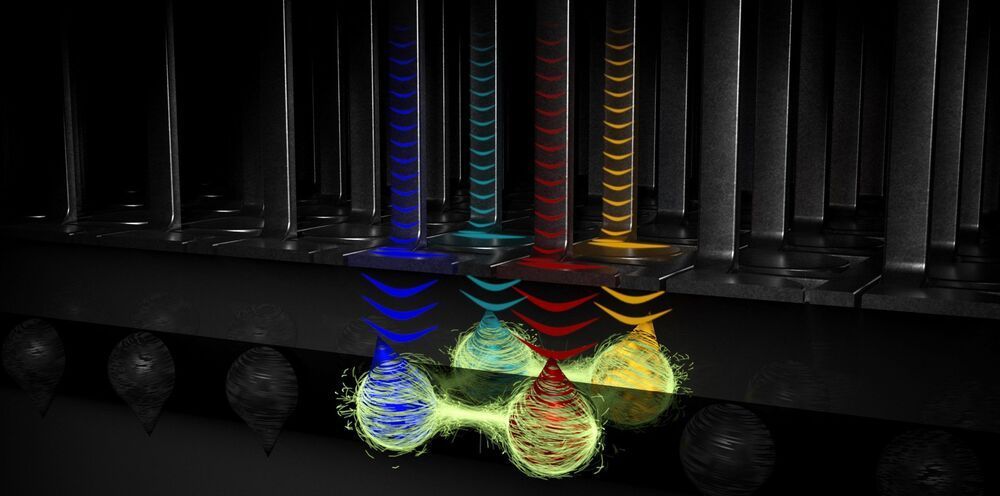But will the effort undermine A.I. ethics?
Primer, the San Francisco A.I. company, is the latest to launch a no-code software system that lets non-experts create and train A.I. algorithms.


Michio Kaku is a professor of theoretical physics at City College, New York, a proponent of string theory but also a well-known populariser of science, with multiple TV appearances and several bestselling books behind him. His latest book, The God Equation, is a clear and accessible examination of the quest to combine Einstein’s general relativity with quantum theory to create an all-encompassing “theory of everything” about the nature of the universe.
The physicist on Newton finding inspiration amid the great plague, how the multiverse can unite religions, and why a ‘theory of everything’ is within our grasp.

The researchers let the cell clusters assemble in the right proportions and then used micro-manipulation tools to move or eliminate cells — essentially poking and carving them into shapes like those recommended by the algorithm. The resulting cell clusters showed the predicted ability to move over a surface in a nonrandom way.
The team dubbed these structures xenobots. While the prefix was derived from the Latin name of the African clawed frogs (Xenopus laevis) that supplied the cells, it also seemed fitting because of its relation to xenos, the ancient Greek for “strange.” These were indeed strange living robots: tiny masterpieces of cell craft fashioned by human design. And they hinted at how cells might be persuaded to develop new collective goals and assume shapes totally unlike those that normally develop from an embryo.
But that only scratched the surface of the problem for Levin, who wanted to know what might happen if embryonic frog cells were “liberated” from the constraints of both an embryonic body and researchers’ manipulations. “If we give them the opportunity to re-envision multicellularity,” Levin said, then his question was, “What is it that they will build?”


As brain activity-dependent human genes are of great importance in human neuropsychiatric disorders we also examined the expression of these genes to postmortem RNAseq databases from patients suffering from various neurological and psychiatric disorders (Table 1). Datasets were chosen based on similarities in tissue processing and RNAseq methodology to our own protocol. We performed a PCA (Principal Component Analysis) of our fresh brain compared to postmortem brain from healthy, Parkinson’s, Schizophrenia, Huntington’s, and Autism brains for the top 500 brain activity-dependent genes that showed the greatest reduction in the healthy postmortem samples. The PCA revealed a significant separation between the 4 fresh samples and the postmortem samples, independent of whether or not the fresh tissue was from epileptic (high activity, H) or non-epileptic (low activity, L) brain regions (Fig. 2 J). This further demonstrates a selective reduction of activity-dependent genes in postmortem brain independent of whether the underlying tissue is electrically active or not.
The sudden removal of brain tissue from a living person in many ways mimics a catastrophic event that occurs with a hypoxic brain injury or a traumatic death with exsanguination. The human brain has high energy needs, estimated to be 10 times that of other tissues21. As a means to understand how the postmortem interval selectively affects some genes and not others in human neocortex, we performed RNAseq and histological analyses in cortical brain tissue as a function of time from 0–24 h at 24 °C in order to simulate a postmortem interval. Neuropathological examination of the tissue used for this study showed a normal-appearing cortical pattern with no histopathologic abnormalities. RNAseq analysis showed a loss of brain activity-dependent genes that were 3-times more prone to be degraded than expected by chance compared to more stable housekeeping genes (Table 2). The threshold to detect activity-dependent genes was related to the probability of being affected by the PMI. The higher the relative expression of the brain activity gene, the more it was enriched in the population of genes affected by the PMI. These findings confirm that genes involved in brain activity are more prone to degradation during the PMI.
One possible explanation for the selective loss of activity-dependent genes could relate to the stability of various cell populations during the simulated PMI. As a means to implicate specific cell populations that could be responsible for the reduction of genes during the simulated PMI we used a clustering algorithm as we have previously described9. We found that 1427 genes (71% known brain activity-dependent genes) could be clustered across the seven time points of the simulated PMI. For these clusters, we used AllegroMcode to identify two main clusters. One cluster of 317 rapidly declining genes was predicted to be neuronal and strongly overlapped with the activity-dependent genes. A second cluster of 474 genes was predicted to be glial, including astrocytes and microglia (Fig. 3A). Remarkably, as the neuronal cell cluster rapidly fell, there was a reciprocal and dramatic increase in the expression of the glial cell cluster (Fig. 3B).

The military’s primary advanced research shop wants to be a leader in the “third wave” of artificial intelligence and is looking at new methods of visually tracking objects using significantly less power while producing results that are 10-times more accurate.
The Defense Advanced Research Projects Agency, or DARPA, has been instrumental in many of the most important breakthroughs in modern technology—from the first computer networks to early AI research.
“DARPA-funded R&D enabled some of the first successes in AI, such as expert systems and search, and more recently has advanced machine learning algorithms and hardware,” according to a notice for an upcoming opportunity.

Artificial microswimmers that can replicate the complex behavior of active matter are often designed to mimic the self-propulsion of microscopic living organisms. However, compared with their living counterparts, artificial microswimmers have a limited ability to adapt to environmental signals or to retain a physical memory to yield optimized emergent behavior. Different from macroscopic living systems and robots, both microscopic living organisms and artificial microswimmers are subject to Brownian motion, which randomizes their position and propulsion direction. Here, we combine real-world artificial active particles with machine learning algorithms to explore their adaptive behavior in a noisy environment with reinforcement learning. We use a real-time control of self-thermophoretic active particles to demonstrate the solution of a simple standard navigation problem under the inevitable influence of Brownian motion at these length scales. We show that, with external control, collective learning is possible. Concerning the learning under noise, we find that noise decreases the learning speed, modifies the optimal behavior, and also increases the strength of the decisions made. As a consequence of time delay in the feedback loop controlling the particles, an optimum velocity, reminiscent of optimal run-and-tumble times of bacteria, is found for the system, which is conjectured to be a universal property of systems exhibiting delayed response in a noisy environment.
Living organisms adapt their behavior according to their environment to achieve a particular goal. Information about the state of the environment is sensed, processed, and encoded in biochemical processes in the organism to provide appropriate actions or properties. These learning or adaptive processes occur within the lifetime of a generation, over multiple generations, or over evolutionarily relevant time scales. They lead to specific behaviors of individuals and collectives. Swarms of fish or flocks of birds have developed collective strategies adapted to the existence of predators (1), and collective hunting may represent a more efficient foraging tactic (2). Birds learn how to use convective air flows (3). Sperm have evolved complex swimming patterns to explore chemical gradients in chemotaxis (4), and bacteria express specific shapes to follow gravity (5).
Inspired by these optimization processes, learning strategies that reduce the complexity of the physical and chemical processes in living matter to a mathematical procedure have been developed. Many of these learning strategies have been implemented into robotic systems (7–9). One particular framework is reinforcement learning (RL), in which an agent gains experience by interacting with its environment (10). The value of this experience relates to rewards (or penalties) connected to the states that the agent can occupy. The learning process then maximizes the cumulative reward for a chain of actions to obtain the so-called policy. This policy advises the agent which action to take. Recent computational studies, for example, reveal that RL can provide optimal strategies for the navigation of active particles through flows (11–13), the swarming of robots (14–16), the soaring of birds , or the development of collective motion (17).


The heart of any computer, its central processing unit, is built using semiconductor technology, which is capable of putting billions of transistors onto a single chip. Now, researchers from the group of Menno Veldhorst at QuTech, a collaboration between TU Delft and TNO, have shown that this technology can be used to build a two-dimensional array of qubits to function as a quantum processor. Their work, a crucial milestone for scalable quantum technology, was published today (March 242021) in Nature.
Quantum computers have the potential to solve problems that are impossible to address with classical computers. Whereas current quantum devices hold tens of qubits — the basic building block of quantum technology — a future universal quantum computer capable of running any quantum algorithm will likely consist of millions to billions of qubits. Quantum dot qubits hold the promise to be a scalable approach as they can be defined using standard semiconductor manufacturing techniques. Veldhorst: “By putting four such qubits in a two-by-two grid, demonstrating universal control over all qubits, and operating a quantum circuit that entangles all qubits, we have made an important step forward in realizing a scalable approach for quantum computation.”
